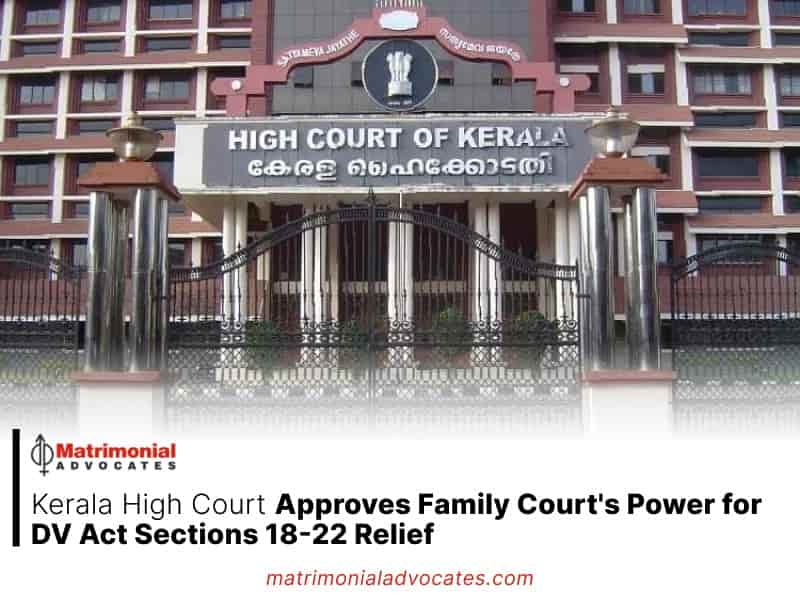
The Kerala High Court has clarified that the Family Court has the legal authority to handle petitions for relief under the Protection of Women from Domestic Violence Act, 2005.
“What is discerned from the provisions of Section 12 is that an aggrieved person is free to elect any of the reliefs. The legislature in the wisdom has framed the Act by taking into consideration the doctrine of election. The parties are free to elect either a remedy under Section 12 or reserve the right to claim other reliefs as provided under Sections 18, 19, 20 and 21 in the manner and mode as has been done. The plain and simple reading of the provisions of Section 26 left the question clear and unambiguous that a party seeking a claim under any provisions of the civil or criminal court much less a family court can always claim relief in addition as provided under Sections 18, 19, 20, 21 and 22 of the Act,” the Division Bench comprising Justice Amit Rawal and Justice C.S. Sudha explained
This legal case pertains to the initiation of original divorce petitions by the petitioner-husband and the respondent-wife in the Family Courts of Alappuzha and Ernakulam, Kerala, alongside the respondent’s simultaneous filing of separate petitions under the Protection of Women from Domestic Violence Act, 2005 (‘DV Act’) in the Ernakulam Family Court. The crux of the dispute lies in the petitioner’s consistent contention that the Ernakulam Family Court lacked the requisite jurisdiction to entertain petitions arising under the DV Act. In response, the petitioner invoked the provisions of Section 12 of the DV Act, asserting that exclusive competence for adjudicating petitions under the DV Act was vested in the Judicial Magistrate.
Section 12 of the DV Act confers upon aggrieved parties, Protection Officers, or duly authorized individuals the prerogative to institute applications before the Magistrate, seeking one or more of the remedies enumerated in Sections 18-22 of the statute. These remedies encompass a spectrum of orders, including Protection Orders, Residence Orders, Custody Orders, Compensation Orders, and pecuniary reliefs.
The petitioner’s argument primarily hinges upon the proposition that if the respondent were permitted to seek such remedies within the purview of the Family Court, the application of Section 12 of the DV Act would be rendered superfluous, thereby giving rise to an incongruity in the legal framework due to the divergent appellate processes associated with these distinct court systems.
In contrast, the respondents posit that Section 12 allows the parties the latitude to exercise discretion in selecting the forum in which they intend to pursue their redress, without compelling adherence to an exclusive avenue for seeking relief.
To assist in resolving this contentious matter, the High Court appointed an Amicus Curiae, a legal expert, who proffered the opinion that the Family Court possessed the competence to appropriately adjudicate cases falling under the aegis of the DV Act. This conclusion was rooted in the argument that the issues addressed by the DV Act primarily encompass civil matters, which are well within the typical jurisdiction of the Family Court. The legal expert substantiated this perspective by reference to specific legal provisions.
Following a meticulous scrutiny of the DV Act, the Court ultimately determined that Section 12 affords aggrieved parties the discretion to elect the forum for seeking relief with regard to DV Act-related matters.
It added that Section 26 of the Act does not denude Family Court from dealing with a petition in a claim under Sections 18, 19, 20, 21 and 22 of the Act. Section 26 expressly states that, “Any relief available under sections 18, 19, 20, 21 and 22 may also be sought in any legal proceeding, before a civil court, family court or a criminal court, affecting the aggrieved person and the respondent whether such proceeding was initiated before or after the commencement of the Act”.
It thus proceeded to declare,
“The apprehension expressed by the petitioner by submitting an application for return of the original petition, in our view is far-fetched and a figment of imagination; rather ought to have pressed the issue of maintainability and lead evidence by leaving the question open for the Trial/Family Court to decide at an appropriate stage. Similarly, the argument that the relief under Sections 18, 19, 20, 21 and 22 cannot be granted by the trial court is also untenable much less opaque, capricious and hereby rejected. The whole purpose of carving out the Family Court Act is to club various provisions by confining the jurisdiction of one court to prevent multifariousness. This is precisely what has been sought in this case”.
It thus held that the order of the trial court rejecting the application based on the appreciation of the provision was legal and justified.





